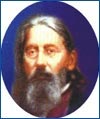Talking increases soreness of chest; lifting aggravates or produces soreness in left chest.
Riding in a carriage gives pain in chest.
Heart Pulse
Awakes with palpitation.
Palpitation irregular, large and small beats intermit.
Pulse either unchanged or full and accelerated.
Neck Back
Shooting in right side of neck, posterior portion.
Pain in the back and small of back as if beaten.
Pain in back as if a hot iron were thirst through lower vertebrae.
Violent stitch in the middle of the back.
Gnawing pain in the back.
Upper Limbs
Pain, as from a sprain, in shoulder-joint, especially on raising the arm.
Sense of tightness in the arm, like from cold.
Burning on the arms and fingers, and in the left elbow, like from a glowing iron.
Arms feel heavy, as if paralyzed; go to sleep.
Rhagades worse in winter and from washing.
Nails brittle or thick.
Panaritium, with brittle nails, lancinating pains and tendency to ulceration of the finger tips.
Lower Limbs
Nates go to sleep when sitting.
Great heaviness in the lower limbs, can scarcely drag them; when walking he staggers, and must sit down evenings.
Burning and smarting-itching on the thighs, better from scratching.
Tearing in the knees and patellae, or from knee to toes.
Numbness of the heel when stepping.
Pain in the sole of the foot on stepping, as though it were too soft and swollen.
Itching and redness of the toes.
Limbs in General
Arms and legs feel heavy.
Frequent stretching of limbs when sitting.
Trembling of the limbs.
Jerking and twitching of the limbs.
Position etc.
Better from moderate exercise in the open air.
Feels moderately well at night, but cannot lie on right side, on account of cough.
Motion of jaw : Raising arms : Reaching : Stepping : Walking : Going up stairs: Going down stairs : Lying quite in bed : Sitting : Must sit down : Sitting stooped : Standing : Stooping : Straightening body up :.
Nerves
Much fatigued by talking.
Faint and tired, must sit or lie down.
Involuntary movements of single parts. Impaired co-ordination.
Spasms with attacks of laughing and weeping; sudden jerks, starts from sleep; paralytic weakness; obstinate spastic anaemia.
Paralysis from spinal disease.
Rheumatic and traumatic paralysis in gouty persons.
Sleep
Sleepiness, with inclination to lie down.
Restless sleep, turns frequently, feels too warm, lies uncovered in unrefreshing slumber, with many dreams and frequent awaking.
Restless sleep, always awaking with palpitation of heart.
Dreams: anxious of boat foundering; of ghosts; of thieves; confused.
Time
Morning : Afternoon: Evening: Night : Toward morning : Day : New and full moon :.
Temperature and Weather
Generally better in warmth, worse In cold air, out-doors.
Worse in-doors, while sitting.
Better walking, out-doors, in mild weather.
Warmth in bed : Open air : Winter :Cold washing :.
Chill Fever Sweat
Chill, with great thirst.
Internal chill and shivering, with desire for warmth of stove with stretching and bending of limbs, worse after warm drink.
Chill during the day, heat at night.
Heat at night, with anxiety and sweat. Heat in the evening, commencing in and spreading from the face, sometimes of only the right side.
Sweat at night, toward morning most profuse in face, frequently only on right side of face.
Entire inability to sweat.
Attacks
At intervals sudden sharp pains, like a stab.
Worse new and full moon, skin symptoms.
Worse in winter, skin symptoms.
Sides
Right : Left: Right to left : Below–upwards : Upper left and lower right side most affected.
Sensation
Sensation of constriction of internal organs.
Some parts of body feel larger.
Some parts–lower jaw and arms–feel shorter.
Tissues
Emaciation; spare habit, and old people.
Contact Injuries etc.
Touch : Pressure of foot on ground: Scratching:, Riding in carriage :.
Skin
Intolerable itching of whole body, especially when getting warm and in bed: scratches until the skin bleeds, which is then painful; itching and formication with flatulence, dry stools or diarrhoea.
Eruptions humid, scabby, sore, gnawing.
Ulcerated surface secretes yellow-brown, badly smelling pus.
Blood-boils : Rhagades : Bulbous excrescences :.
Stages and States
Infancy : constipation, especially when artificial food is used.
Cholera infantum, stools green, acidity of primae viae.
Constipation of sucklings.
Strabismus.
Puberty : chlorosis, with longing for indigestible substances.
Dark complexion, excitable.
Mild disposition.
Lack of animal heat.
Spare habit.
Old people, hypochondriacal.
Relationship
Similar to : Baryta Carb. (hypochondriasis of aged; constipation); Bryon. (peevish, irritable; gastric and abdominal symptoms; constipation; throbbing headache; dry cough with vomiting; stitches in chest; dryness of mucous surfaces; fever; etc.); Calcarea ostr.; Chamom. (useful as an intermediate remedy); Conium. (old people; loss of power of internal recti of eyes); Ferrum (chlorosis; relaxed abdomen; disgust for meat, etc.); Ferrum jod (profuse, transparent leucorrhoea); Graphit. (chlorosis; skin rough, chapped, itching; nails, blepharitis, etc.); Ipecac. Laches. (sad on waking; climaxis); Pulsat. (tearful, peevish; heat, etc.; better in open air; ozaena: taste lost; averse to meat; chlorosis; scanty menses; complaints at puberty; lack of animal heat; soles of feet sore, worse walking; toes red, itching, etc.); Plumbum. (colic; constipation, etc.); Ruta (loss of power of internal recti of eyes); Sepia (irritable, tearful; ozaena; scanty menses; puberty, prolapsus uteri; inactive rectum; weakness in urinary organs, etc. Silicea, Sulphur., Zincum (inner canthus; granular lids).
Compare with the following in clergyman’s sore throat : Argentum nitr., Kali bich., Lycop, etc.
Alumina follows Bryon., Laches., Sulphur; and is followed by Bryon.
Alumina and Bryon. are complementary.
Chamom. is useful as an intermediate remedy.
Antidotes to Alum : Bryon., Camphor., Chamom., Ipecac.
Alum antidotes : lead poisoning, as in painter’s colic; ailments from lead.

